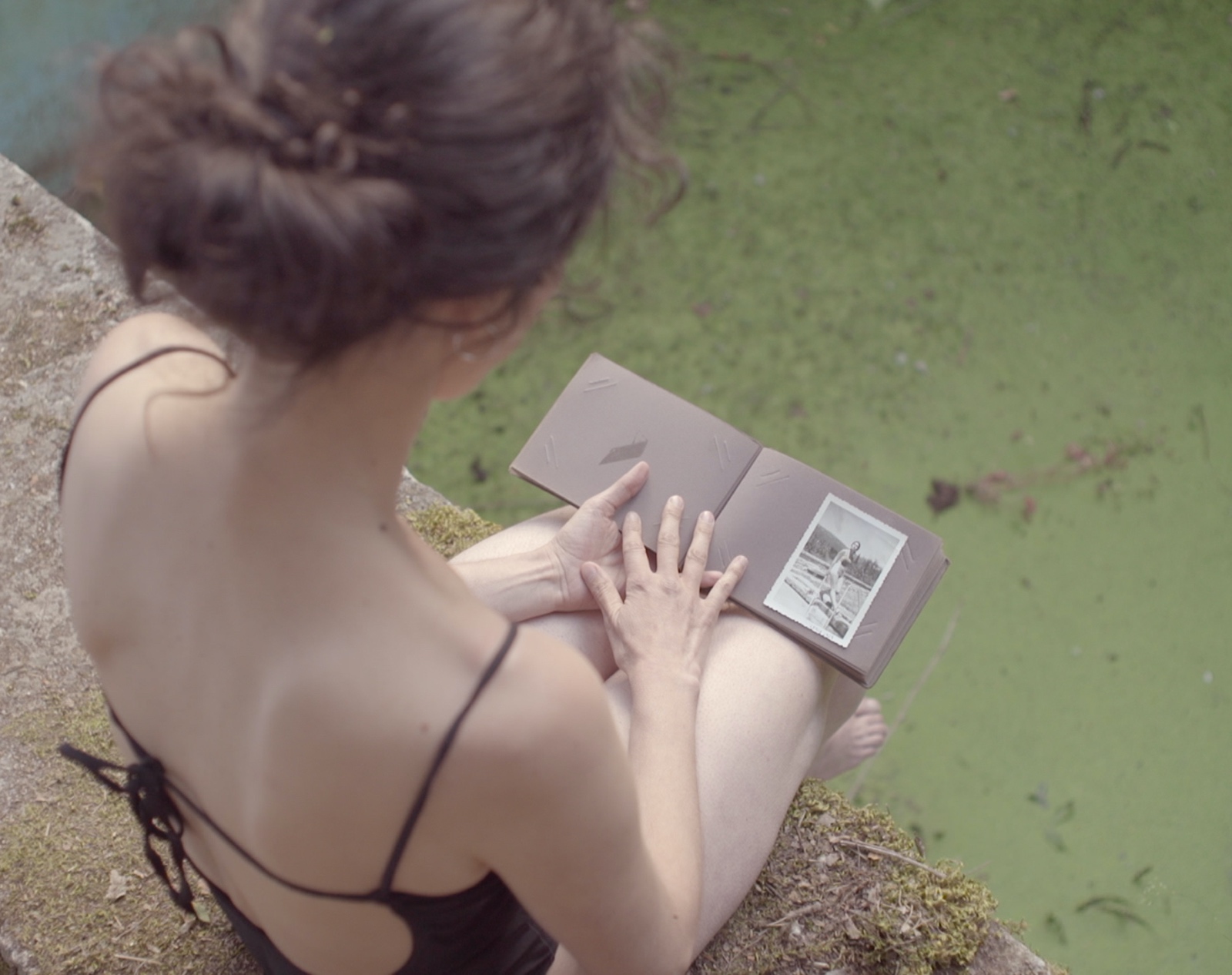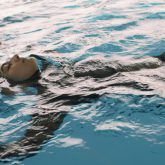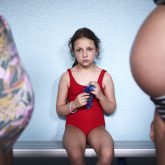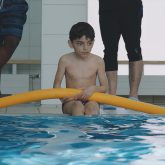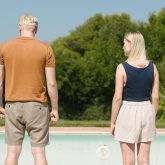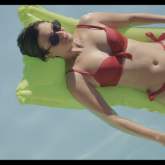We spend our whole lives rejecting boundaries, only to realize that they’ve become our comfort zone. If the sea is an ancestral call, open and mysterious, the pool is its domesticated version: geometric, measurable, designed to give us the illusion of floating in paradise. A perfect project, but only on the surface. A symbol of our relationship with ourselves, with control, and with others. In 1967, it is the alienated young man of Mike Nichols’ The Graduate who, to the poignant notes of The Sound of Silence, revels in nothingness, lying on a raft in his family’s pool, in the heart of a disillusioned bourgeoisie. Just one year later, in La Piscina by Jacques Deray, Alain Delon and Romy Schneider swim in the same crystalline water, experiencing the illusion of a summer happiness that will eventually expose his failure – as a writer, a man, a partner. Summer is a bittersweet idyll, one that confronts us with the privileges we have and their absence. But also with the pool as a dual tool: a place of meeting and exclusion, of community and alienation. For it was born exactly that way: as a reassuring replica of the sea, free of algae, dirt, and danger. A wondrous, deeply human attempt to make that water part of us, and us part of it. But in this process, something slips away from us.
An unintended side effect: the water, so perfect, starts to reflect. It becomes a mirror. And we, modern Narcissuses, risk falling into it. We return with a selection of 7 films in which the pool is not just a background, but a living surface. A mirror where characters and society reflect, scrutinize, and lose themselves. Sometimes they drown. Sometimes, they resurface.
Villetta con piscina by Karma Gava, 2024
A summer afternoon, a villa on a hill overlooking a lake, a perfect, blue, silent pool. Simone is fifteen and has invited a few friends for what should be a carefree afternoon. But something unsettles him: desire, inadequacy, a body that still doesn’t feel like his own. Everything is too sharp: the white light hitting the water, the voices of others bouncing off the walls, the feeling of being out of place. The pool, which should offer relief and lightness, here becomes a source of embarrassment and discomfort, making the protagonist move slowly. First-time director Karma Gava offers a freeze-frame on the transition from adolescence to adulthood, between personal desire and expectations, between the desire to belong and the failure to do so. The water is not a purifying element here, but a substance that immobilizes. The body doesn’t float: it holds, stiffens, retreats. The glossy imagery of Italian bourgeois summers is turned inside out, without big events or explanations—just a sudden gesture, a break, a moment that shifts the dynamic. The short closes at the exact point where something has broken, and where everything – perhaps – could truly begin.
Chlorine by Melissa Anastasi, 2019
Keira is eleven and has a mother who can’t be there. She lives in a rural part of Australia, among prefab houses, empty skies, and painfully long silences. Every day, she crosses town to reach a public pool frequented by pregnant women: full, warm, lively bodies. She, on the other hand, is slender, alone, and in need of human contact. She starts stealing items from bags: creams, wallets, small everyday amulets. But they can’t truly be considered thieves. Perhaps, it’s an attempt to belong to someone through these very objects. Or at least to feel something. Chlorine, written and directed by Melissa Anastasi, is a twelve-minute short that speaks with extreme delicacy about that feeling that often hits us as children: the sense of being invisible to the eyes of the grown-ups, to our parents. The images are bare, sharp, made even more essential by Bonnie Elliott’s photography: a milky light that never comforts. The pool, in this context, is neither a playful nor a sports venue. It’s a collective womb, a suspended space where the desire for care takes the form of a missed gesture. Anastasi never judges her protagonist, doesn’t infantilize her, doesn’t redeem her. She simply observes her and forces us to do the same. In one of the final scenes, Keira dives into the cold water, while everything around her stays still. No one notices her. But for a moment, just for a moment, she seems to breathe.
Ayaneh by Nicolas Greinacher, 2019
Ayaneh is sixteen, born in Afghanistan, and now living in Switzerland as a refugee. She wears a veil, moves discreetly, and observes. She hardly ever speaks, but when she does, the words seem to slip just below the surface. One day, she meets Anna, a Swiss girl of her same age, at the local pool. They exchange a glance, then a sentence, then a promise. It’s the beginning of something subtle and destabilizing. Nicolas Greinacher’s short, produced by Talkhon Hamzavi, works on the edge: between cultures, desires, rules, and freedom. The pool is a place of discovery and connection, but also exposure. Ayaneh enters the water in a burkini, moving awkwardly and lightly. Anna watches her, encourages her, and gives her a swimsuit. But what is an opening gesture for one is an irreversible transgression for the other. The short – a winner at several festivals – successfully portrays not only the identity conflict of those living between two worlds, but also the complexity of minimal gestures: a change of clothes, a swim, a laugh. Everything becomes laden with meaning. And the water, which should unite and support, becomes dense, almost guilty. In the end, Ayaneh remains silent. But those watching can no longer pretend otherwise.
Silent Land by Aga Woszczyńska, 2021
A Polish couple rents a luxury villa in Sardinia. The house is perfect, white, silent. But the pool is empty. It’s just a detail, a technical mishap. And yet, that’s where everything starts to crack. In Silent Land, Aga Woszczyńska’s debut feature, the emptiness of a pool becomes a crack that widens in the lives of its characters, swallowing everything. Adam and Anna are beautiful, composed, and efficient. But they don’t speak. And they don’t feel strong emotions. The only desire is to fix the pool, to make everything return to its place and restore the perfect image of their vacation (and their life). When a worker dies during the repairs, the tragedy is met with the same detachment as one would treat a domestic inconvenience. The film prompts reflection on the concept of control—over bodies, emotions, and the environment. The empty pool is the symbolic space of the protagonists’ failure: a perfect form, but without substance. Woszczyńska constructs every shot with surgical precision, letting sound – or its absence – guide the gaze. The Mediterranean becomes a mute, inhospitable, almost hostile backdrop. And the pool, no longer an accessory but a disgraced epicenter, transforms into an emotional abyss that sucks away any remaining humanity.
La piscina (un perpetuum mobile) by Enrique Lafuente, 2020
A woman swims. She just swims. She enters the water, swims one lap, then another, then another. No voiceover, no dialogue, no frantic editing. Just a body in motion, with the water accompanying it. But in that repetition, something deeper hides. The short, filmed in 16mm in a public pool, is a hypnotic exercise on time, obsession, and effort. Every move is the same yet always different. Every turn is a ritual, every immersion a fragment of a feeling. The pool, as a physical structure, imposes a boundary: the space is limited, the lanes drawn, the rhythm dictated. But the protagonist’s body – played by an amateur performer – seems to want to resist, sabotage that order. The direction is intentionally just as obsessive: it lingers on the details: breathing, the sound of chlorine, bubbles, refracted light. Gradually, every action becomes abstract, meditative, calming. It’s as if the woman is trying to empty herself of the world, to dissolve in the water. But the water doesn’t forget, and at the end of the pool, there’s always a wall.
Seahorse (Seepferdchen) by Nele Dehnenkamp, 2020
To earn the Seepferdchen (seahorse) badge in Germany, children must demonstrate their ability to swim 25 meters. While it may seem like a simple task, almost trivial, for the protagonists of this documentary – refugee children, freshly arrived from war-torn countries – it’s something filled with immense tension. Nele Dehnenkamp’s film follows their movements in the pool with a respectful and empathetic gaze, allowing the small gestures, hesitations, and smiles to speak for themselves. The pool, here, is both a personal and political space: a place of learning, certainly, but also of social confrontation, fear, and emancipation. The children must learn to float, to stay afloat. It’s an obvious metaphor, but never forced. Dehnenkamp alternates between close-ups and wide shots with a refined balance, allowing emotions to emerge naturally without manipulation. And while the instructor gives rules and encouragements, the little swimmers hold their breath, move forward, hesitate, and try again. In the end, the badge isn’t a prize, but a small truth: floating means surviving, swimming means being free.
La Piscina by Santiago Cardelús & Pablo Manchado, 2023
Madrid is a scorching city, where the asphalt melts under the summer sun and the air remains still, heavy like an unspoken thought. Miguel lives on a barren terrace in a working-class building, and every day he looks towards the pool of a nearby chalet: a rectangle of azure water that shines like a mirage, a promise of relief that always seems just out of reach. Then Edu arrives, a new neighbor, noisy, intrusive, one of those who disturb the order without even meaning to. “He’s a problem,” say the others. But he is also the spark that ignites something. In the 22 minutes of La Piscina (The Swimming Pool), Santiago Cardelús and Pablo Manchado tell, in tragicomic tones, the clash between two opposing personalities, forced to share a space and a daily routine. The pool – real or imagined – becomes the center of a silent conflict: who can use it? Who deserves it? Who controls it? While Miguel observes, acts discreetly, and dreams, Edu acts, disturbs, and overwhelms. Forced coexistence explodes in small daily frictions, in jealousies and violated boundaries, in tensions that accumulate without ever fully exploding. There are no shouts, no fights, but every line and every silence load the pool with an increasingly layered meaning. The water, desired but inaccessible, becomes the measure of frustrated desire, the surface that reflects the need for affirmation and the fear of losing space, voice, and rights. The short speaks to us about the bourgeois dream of ownership, shared fragilities, and the thin line between freedom and domination. And leaves us with an open question: is that pool really what’s missing? Or is it just the pretext to give shape to a pre-existing discomfort?
